 ChatGPT
ChatGPT
 Grok
Grok
 Perplexity AI
Perplexity AI
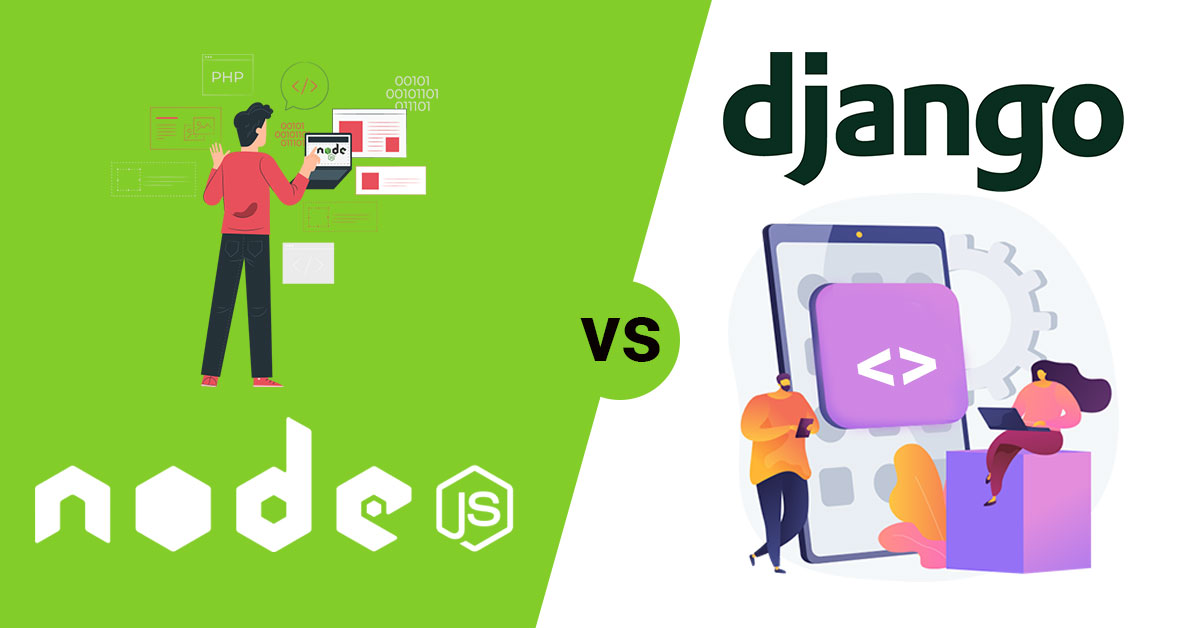
4 min read | By Admin | 12 January 2022 | Frameworks
In the technological advances world, numerous organizations are keen to build web apps for their business to expand their comprehensive reach and enormous growth. According to web app development, the framework is the most prominent matter for the seamless user experience.
Unlike numerous other development tools, frameworks offer a pre-defined codebase and guidelines to facilitate seamless web development. At the same time, it speeds up the development process and shortens market time by shortening the app development life cycle.
There are many programming languages and frameworks available to build a web app. Hence, choosing a framework must not be taken lightly, it’s a long-term commitment. So, ensure that you make the right selection. For your convenience, we have two popular web app frameworks Node js and Django.
In this article, we would like to differentiate between Node js vs Django features and pros & cons to streamline your decision smoothly for your future web app development. Let’s consider through this article, Django vs Node js which is better for app development in 2022.
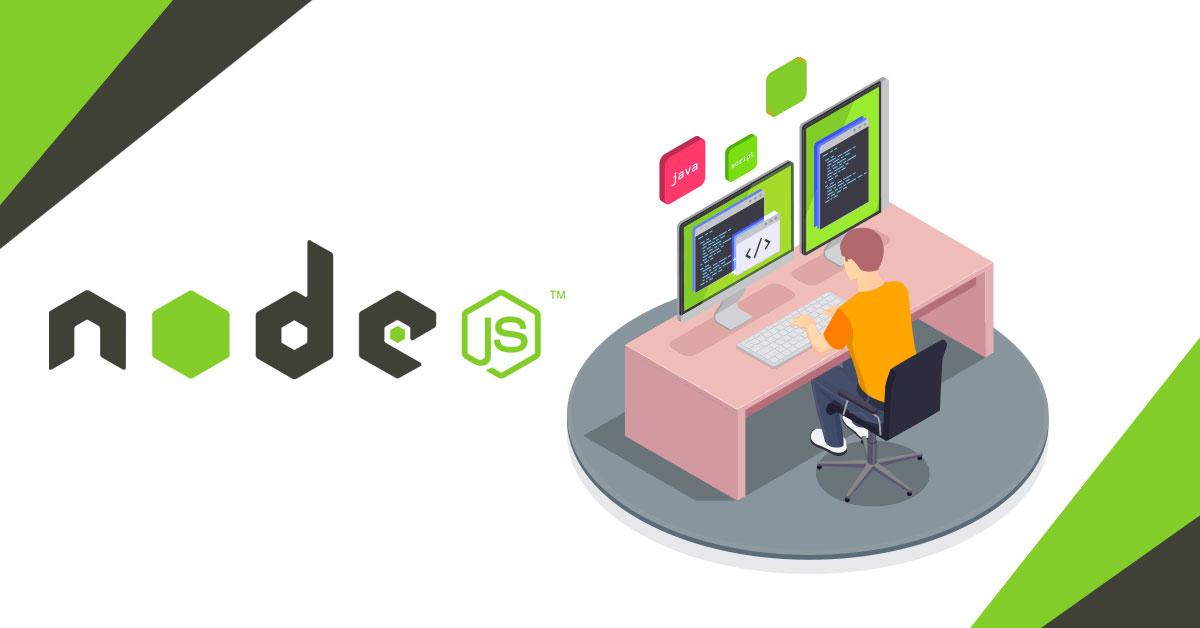
Node.js was born in 2009, it’s an open-source server environment and it allows you to run JavaScript on the server. As an asynchronous event-driven JavaScript runtime built on Chrome’s V8 JavaScript engine, Node.js is designed to build scalable network applications.
Node.js runs on various platforms: Windows, Linux, Unix, Mac OS X, etc. Node.js writes command-line tools using JavaScript, and server-side scripting – a running script that allows you to create dynamic web page content before the page is sent to the user’s web browser using the server page.
As a result, Node.js represents the “JavaScript ubiquitous” paradigm, integrating web-app development around a programming language rather than different languages for server-side and client-side scripts.
Node.js brings event-driven programming to web servers, enabling the development of fast web servers in JavaScript. Developers can create scalable servers without using threading, by using a simplified model of event-driven programming that uses callbacks to signal the completion of a task.

𝐄𝐚𝐬𝐲 𝐭𝐨 𝐬𝐭𝐚𝐫𝐭 – Getting started with Node.js is very easy. This is a must-have, for any web app developer. With a lot of tutorials and a great community, it is very easy to get started.
𝐒𝐜𝐚𝐥𝐚𝐛𝐢𝐥𝐢𝐭𝐲 – Node js offers a seamless experience for your apps, It being single-threaded and capable of handling a large number of connections simultaneously with high performance.
𝐀𝐩𝐩 𝐬𝐩𝐞𝐞𝐝 – Unbroken thread execution makes Node.js even faster and more efficient.
𝐍𝐨𝐝𝐞.𝐣𝐬 𝐏𝐚𝐜𝐤𝐚𝐠𝐞𝐬 – Extensive set of open-source Node.js packages will make your job easier. Today there are over a million packages in the NPM ecosystem.
𝐏𝐨𝐭𝐞𝐧𝐭 𝐛𝐚𝐜𝐤𝐞𝐧𝐝 – Node.js is written in C and C ++, which adds features such as faster and networking support.
𝐌𝐮𝐥𝐭𝐢-𝐩𝐥𝐚𝐭𝐟𝐨𝐫𝐦 𝐬𝐮𝐩𝐩𝐨𝐫𝐭 – Cross platform app development support allows you to build SaaS websites, desktop and mobile applications using Node.js.
𝐌𝐚𝐢𝐧𝐭𝐞𝐧𝐚𝐧𝐜𝐞 – Node.js is an easy choice for developers because both front and backend can be managed as a single language with JavaScript.
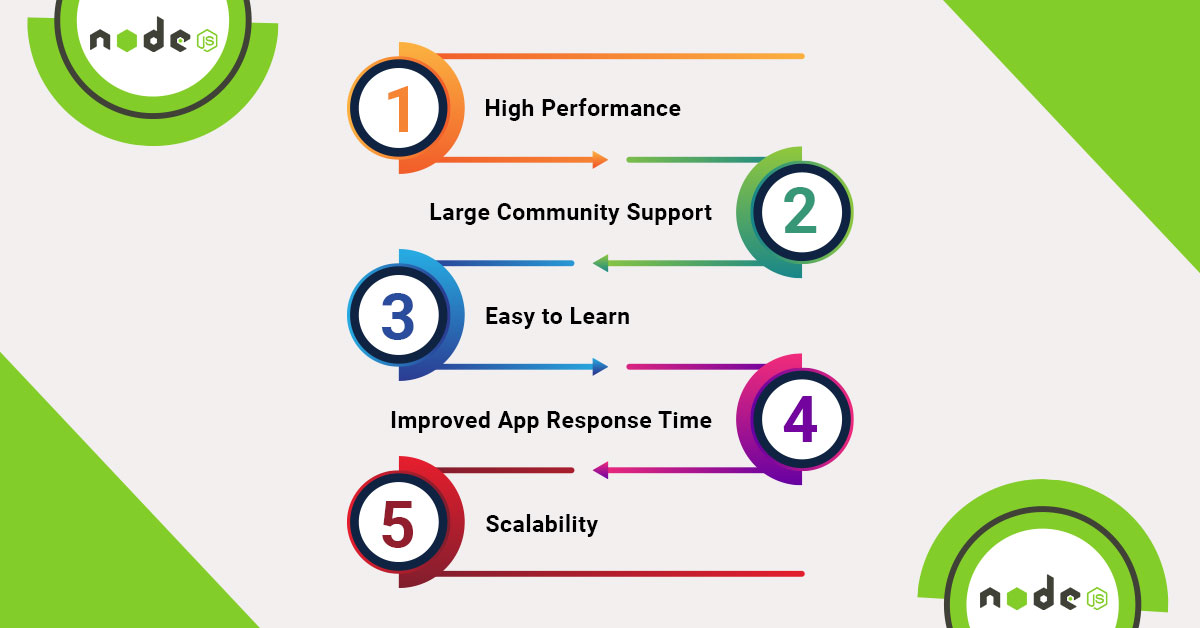
Node js is considered a feasible solution when building scalable web apps. If you want your modern applications to work up and down as needed, Node.js is the best programming language because providing it improves the overall performance of web applications.
➣ High performance and speed
➣ Improved app response time
➣ Enhanced overall productivity and better efficiency
➣ Community support to simplify development
➣ A plethora of free tools for the developers to choose from
➣ Low learning curve
➣ Feature of code sharing and reuse
➣ Extensibility to meet customised requirements
➣ Ease of communication and knowledge sharing within the team
➣ Reduces loading time by quick caching
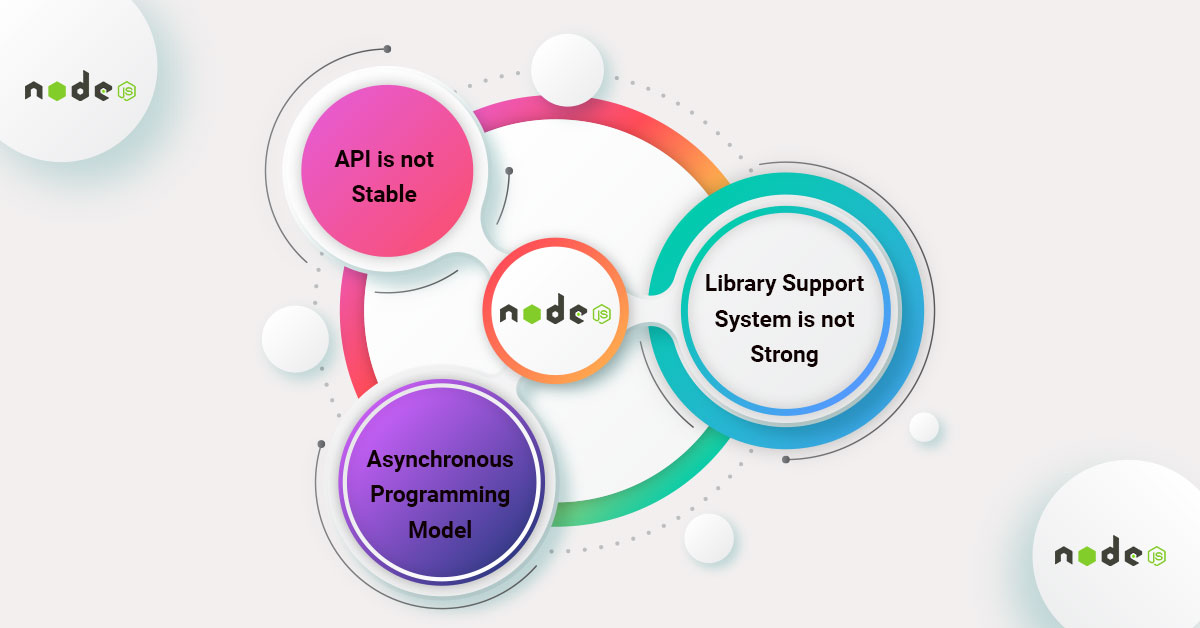
One of the biggest drawbacks of Node.js is that it cannot perform heavy computational tasks. Node.js is capable of running JavaScript code on a single thread basis only.
➣ Inability to process CPU bound tasks
➣ Lack of library support can endanger your code
➣ Unstable API
➣ Difficult to maintain code
➣ Poor quality tools
➣ Asynchronous programming model

Django is a free and open source high-level Python web framework that encourages rapid development and clean, pragmatic design. Django makes it easier to build better web apps more quickly and with less code.
With Django, you can take web apps from concept to launch in a matter of hours. Django takes care of much of the hassle of web development, so you can focus on writing your app without needing to reinvent the wheel.
It has a thriving and active community, great documentation, and many options for free and paid-for support. Django can be used to create any website development, from content management systems to social networks and news sites.
It can work on any client-side framework and can deliver content in any format (HTML, RSS feeds, JSON, XML, etc.)
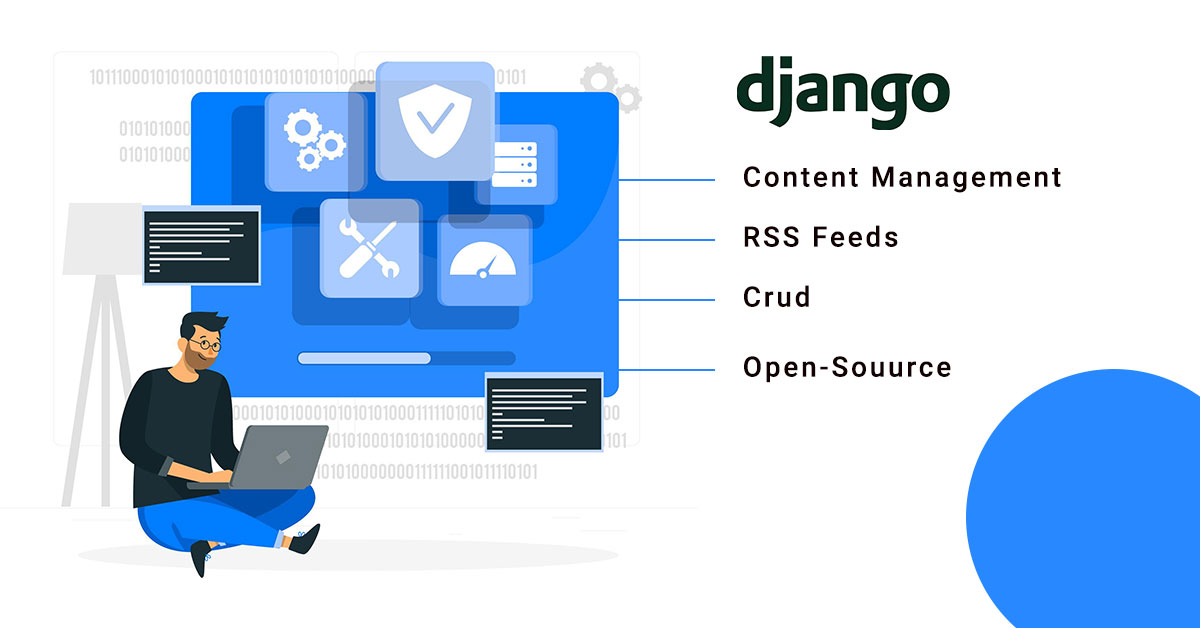
Django is often used to allow developers to focus on new application components instead of spending time on already created components. Django is more feature-rich than various other frameworks on the marketplace.
Also it takes care of a lot of difficulties that were involved in web development and enables developers to focus on creating the components needed for the app.
𝐅𝐮𝐥𝐥𝐲 𝐥𝐨𝐚𝐝𝐞𝐝 – Django has dozens of additional features that you can use to handle common web development tasks. It ensures various tasks in user authentication, content management, sitemaps, RSS feeds in app development.
𝐑𝐢𝐝𝐢𝐜𝐮𝐥𝐨𝐮𝐬𝐥𝐲 𝐟𝐚𝐬𝐭 – Django is designed to help developers complete applications from the concept as speedy as possible.
𝐈𝐧𝐜𝐫𝐞𝐝𝐢𝐛𝐥𝐲 𝐯𝐞𝐫𝐬𝐚𝐭𝐢𝐥𝐞 – Numerous organizations and governments have used Django to build all sorts of things from content management systems to social networks to scientific computing platforms.
𝐄𝐱𝐜𝐞𝐞𝐝𝐢𝐧𝐠𝐥𝐲 𝐬𝐜𝐚𝐥𝐚𝐛𝐥𝐞 – Some of the busiest sites on the planet use Django’s ability to quickly and flexibly scale to meet the heaviest traffic demands.
𝐑𝐞𝐚𝐬𝐬𝐮𝐫𝐢𝐧𝐠𝐥𝐲 𝐬𝐞𝐜𝐮𝐫𝐞 – Django takes security seriously and helps developers avoid many common security mistakes, such as SQL injection, cross-site scripting, cross-site request forgery, and clickjacking.
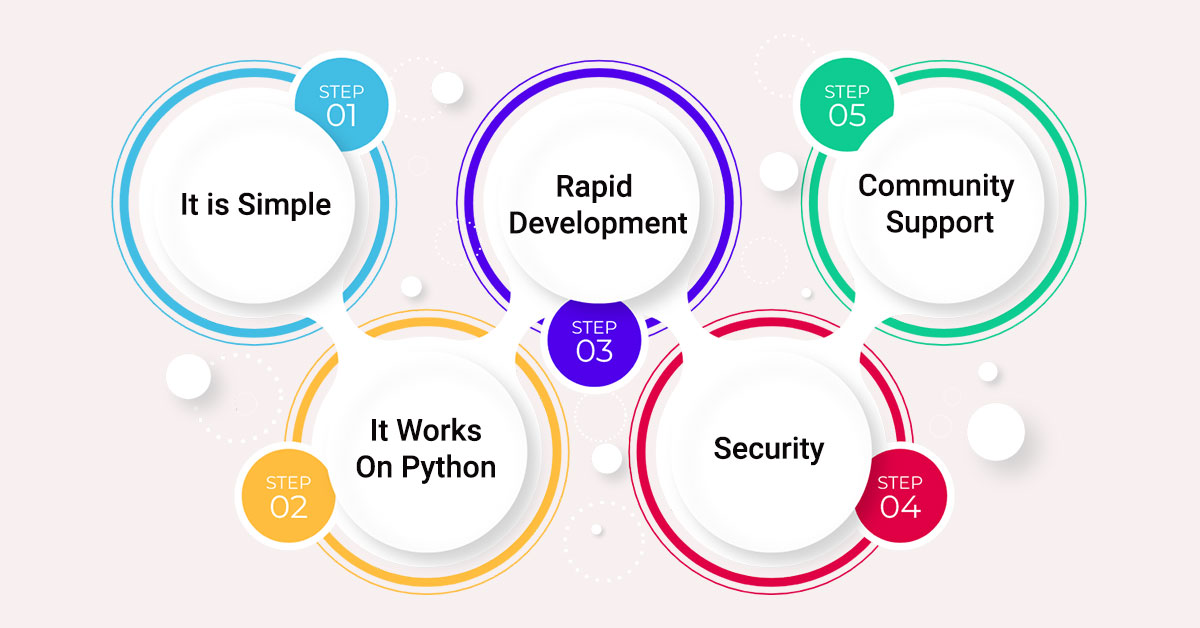
Django is considered to be the ideal choice for web app development that has the features of making it quick to develop, the easy syntax structure, and loads of in-built libraries and packages that help developers to get everything arranged in one place.
➣ Excellent documentation for real-world apps
➣ Django is batteries included
➣ Stellar documentation and tutorials
➣ Django is immensely scalable
➣ Built-in template language
➣ Better CDN connectivity
➣ Django is crowd-tested technology

Django is designed to build large applications quickly, and this requires server processing time and bandwidth during development. The main drawback that a small project developer may face is confusion with all the unnecessary and unique functions.
➣ Django is monolithic
➣ Lack of conventions
➣ Difficult to learn
➣ Incapable of enabling individual processes
➣ Not suitable for smaller projects
| S.No. | NodeJS | ReactJS |
|---|---|---|
| 1. | Node js is an open-source framework that runs on JavaScript. | Open-source Python framework to build web applications in a stipulated time frame. |
| 2. | Node js is a runtime environment and thus, works on an event-driven model. | It follows the MTV model template view to help with handling data for validating and interacting. |
| 3. | Node js is not as secure as Django and requires manual operations in the system to manage security flaws. | Django is more secured and comes with a built-in system, preventing any security deficiency. |
| 4. | Node js offers excellent performance, as it allows the web professionals with more freedom when it comes to implementations. | Providing finest performance, as there is a built-in house template system facilitating the execution of a required task quickly. |
| 5. | This framework is easy to learn but consumes more operating time. Thus, it is a less cost-effective option. | The Django framework is more efficient and offers fast speed. And so, it is more cost-effective. |
| 6. | NodeJS, which is gaining popularity around the world and growing steadily. | Django has a more solid reputation. |
Through this article, you have acquired a lot of knowledge about Node js vs Django performance with its boon and bane. Furthermore, we discussed numerous aspects of these two popular technologies, and both frameworks are ideal to build large-scale web apps.
Node js, allows the developer to create more flexible web applications smoothly with seamless performance and Django is highly secure, where it effectively maintains passwords and provides many libraries.
Therefore, Before choosing any of them, you need to understand our needs. Once you have decided on the essential and preferred requirements for your web application, consider this guide for choosing the best one in Django or Node js.
Or if you need further assistance for your web app development project, do consider our app development services. Our expertise team at the forefront of the industry will help you generate favorable outcomes.
Node.js uses JavaScript for both frontend and backend, excelling in real-time applications. Django combines Python backend with varied frontend tech for comprehensive web development.
Node.js supports cross-platform development through its event-driven, non-blocking architecture, making it suitable for real-time applications. On the other hand, Django’s primary focus is backend logic, offering a consistent and organized way to build web apps across platforms.
Node.js is well-suited for applications requiring real-time updates, like chat apps and streaming services, due to its asynchronous capabilities. Django is ideal for complex business logic and content-heavy platforms that prioritize structured development.
Consider factors like your team’s expertise in JavaScript or Python, the nature of your application (real-time or content-driven), and the scalability requirements to determine whether Node.js or Django aligns better with your project goals.
Node.js might provide better performance for applications demanding real-time interactions, while Django emphasizes maintainable and structured code, suitable for larger cross-platform projects where development speed and organization are crucial.
Join over 150,000+ subscribers who get our best digital insights, strategies and tips delivered straight to their inbox.